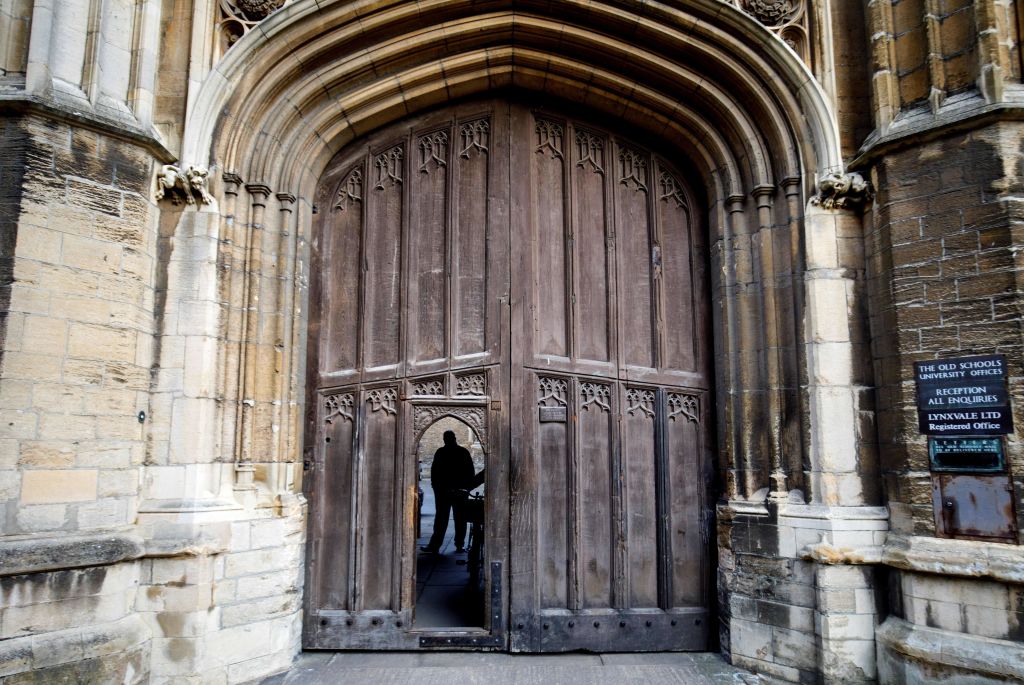My great friend Dr Noah Carl joins a group of distinguished academics removed from their posts this spring. But while Jordan Peterson (visiting fellowship rescinded by Cambridge) and Sir Roger Scruton (sacked as a commission chair by James Brokenshire) can arguably hold their own and get on with their lives, Noah – an early-career Junior Research Fellow at St Edmund’s College, Cambridge – has been fired from his only job, made unemployed by the braying mob.
When Noah first told me of his appointment in Oxford’s Turf Tavern last year, it was a great cause for celebration. A Junior Research Fellowship is, after all, something of a holy grail for aspiring academics.
Within weeks that joy turned to ashes in his mouth. And for the past few months, a Rhodes Must Fall-type movement have found in Noah the necessary scapegoat to show the world their devotion to eradicate “racism” and “white supremacy”.
Students
marching through St Edmund’s College,
protesting formal dinners and forming a human chain in front
of Cambridge’s Senate House are some of the more imaginative methods of protest that have been held as a result of Noah’s appointment.
Yet what crime had this mild-mannered, intelligent, kind, and above all loyal friend actually committed? To have attended a conference attended by race researchers and been published in a journal with a controversial editor (verdict: guilt by association). To have defended free inquiry in his highly-praised paper “How Stifling Debate Around Race, Genes and IQ Can Do Harm” (verdict: guilty of racism). And to have published in the field of stereotype accuracy (i.e. looking into whether stereotypes that people hold of certain groups are accurate or not?), number among the list of his apparent wrongdoings.
Salivating at these crimes, tenured dons and junior academics rounded on Noah in December, producing a hysterical letter with 1400 signatures in a few days. This then sparked the investigation whose report the college government body voted on within the last few days, and which resulted in Noah losing his fellowship.
So who are the academics who actually signed the letter? And are they familiar enough with Noah’s academic field to condemn him? I wrote to every Oxford academic who’d signed it, requesting “reasons why you believe that his research was ethically suspect and methodologically flawed”. I received a few telling replies:
Prof John Parrington (pharmacology, Fellow at Worcester College) told me:
“Having looked at Noah Carl’s published work I consider it racism masquerading as scholarly enquiry…the findings of recent years…show that the concept of ‘race’ has no scientific validity, so for Cambridge to appoint [him]…shows a serious error of academic judgement.”
So Noah defends people’s right to do race research. Parrington doesn’t believe in race as a scientific concept. Therefore Noah is a racist. Parrington then went on to say:
“So, yes, I did look into this matter closely before signing the letter, and to be honest, I find it rather impertinent that you might consider a senior academic like myself would not do such a thing.”
Of course being a silly undergraduate who am I to forget to genuflect before professorial omniscience?
Dr Antonia Ruppel (classics post-doctoral researcher at Oxford) also responded. She told me:
“Before signing the letter, I googled Noah, and what I found online convinced me to add my signature to the letter.”
Clearly a fine testament to scholarly rigour that was applied in attempting to get a junior research fellow fired. No doubt Dr Ruppel will go on to a Regius Professorship, but one wonders what she
thinks constitutes “ethically suspect and methodologically flawed” research.
These two, at least, had the courtesy to reply to my request – unlike the other Oxford staff I contacted.
World-leading academics have rounded to support Noah, including Jeff McMahon, Peter Singer and Jonathan Haidt. But in universities, such voices are rare today. Less brave dons fidget with the curtains before closing them, choosing instead to settle down to Norman fonts (as John Betjeman might
have it).
The most damning indictment of the academic world, however, comes from Matthew Bullock, Master of St Edmund’s College, Cambridge, at which Noah was a Junior Research Fellow. To the still bloodthirsty student body he wrote: “I apologise unreservedly for the hurt and offence felt by all members of the [student body].”
And with those words, a once dignified financier was reduced to throwing a young and bullied scholar to the crowd, jettisoning academic freedom for the sake of the affected feelings of an outraged mob.
Most popular
The film Nuremberg is almost unforgivable
Hugh Campbell is an undergraduate at Oxford University






Comments